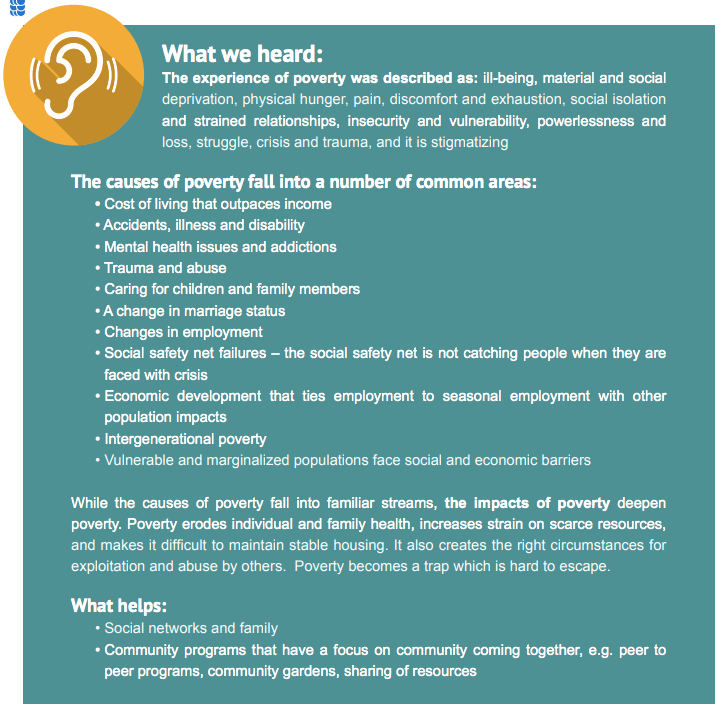Roundtable holds public meeting to release poverty report

Community members gather for the release of the Poverty Roundtable report at Maranatha Church in Belleville. Photo by Rachel Bell, QNet News
By Rachel Bell
BELLEVILLE – The Hastings-Prince Edward Poverty Roundtable released a report on Tuesday about poverty’s causes and solutions in this area.
The report contains information gathered when members of the roundtable spoke with over 400 people who have experienced poverty, or are currently in that situation.
Christine Durant, director of the organization, said the report is one of three that will be shared with the community. The report is a reflection of the feedback the organization received from the public, she said.
“One of the things we hope it does is help our community understand poverty and bring us together, rather than segregate and separate us,” said Durant.
Talking to those who have experienced poverty themselves is the best way to find solutions, she said.
“The report is really about what people’s experience is in poverty, and that experience is expertise. And if we we want to look at ending poverty, the solution is really with those who experience it deeply.”
Loretta Tweed of Belleville shared her story of having a hard time making ends meet.
“We are barely surviving, and definitely not thriving,” she said. “You’re constantly having to prioritize.”
For instance, Tweed said, she wasn’t able to afford a bus pass this month.
“For a lot of people, it’s because the month is longer. And January and February were pretty rough, but this month I should have got my bus pass sooner. But I kind of let it go, and you spend the money,” she said. “That money sometimes is like – ‘Okay, I could take that money and buy food.’ ”
Durant says there are different forms of poverty, and that she wants people to come together and understand what those forms are.
“A lot of people when they hear the word poverty, they have a really strong reaction to it, and tend to think someone’s just homeless, and just having the worst time ever,” she said. “And that is poverty, but there’s also poverty where something has happened. You’ve lost a family member, and you’re in grief and not able to work. Or you’ve been struck by an illness and you lose an income and you find yourself cash-strapped.”
Tweed gave a personal example of this. She suffers from anxiety and depression, has a son who’s struggling with a mental-health issue, and had a daughter who died.
“It’s helpless sometimes, and you feel hopeless,” she said.
The goal of the report is to help the community better understand how to address poverty in the community, and make changes in the right direction.
“We’re really hoping this report will help our community members understand, and will begin to think about knowledge that comes from experience and really value that, and to look at how we can work differently,” Durant said. “How we can work together and how we can change things.”
Kimberly Ann Robertson, a volunteer with Nightlight, an organization that offers a safe space twice a week to those in need, said she believes improving communication would help those in poverty.
“Communication is really hard for people, because I’ve found that they move around so much. And some of them have addiction problems where they would sell a phone that we were paying for,” she said. “So it’s not like you can call them and find them, and if you can’t call somebody and find somebody … you can’t necessarily get them the help they need.”


With files from Community Conversations on Poverty in Hastings Prince Edward.
"You are treated differently when you're working and when you're not," says a Belleville local who is currently living in poverty. "I'm constantly living in fear, how and when am I going to eat? How am I going to get it?"
— Rachel (@rbell_news) March 20, 2018
 Print This Post
Print This Post






